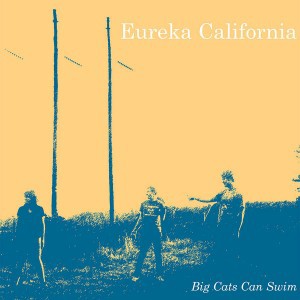Eureka California will make you want to start a band. It’s tough to think of a greater compliment for a DIY/garage rock band than that one, but with this album, they’ve earned it. Big Cats Can Swim has 11 wholly distinct songs, each of which showcases a different strength in Jake Ward’s seemingly bottomless bag of songwriting tricks, yet they also work incredibly well together.
The tough, fast punk of The Ramones shows up to kick things off with “I Will Control The Nation” before the perfect chord progression of “Bite by the Sand” adds a wild jerkiness, complementing the stability of the first song.
I’m a sucker for albums that move, albums that actually mix things up between tracks, and it’s been a while since I’ve heard a record whose first two songs are as directly juxtaposed as Big Cats’. Credit for the whiplash between the two tracks must also go to drummer Marie Uhler, whose work on “Bite by the Sand” and tracks like “My Boy, Black Metal” is reminiscent of Gary Young’s best work in Pavement’s early days.
Other sections of the album also work in tandem the way the opening two tracks do, such as the ballads “Heaven” and “My Kind of Battery.” “Heaven” isn’t a weak song so much as it is a victim of sequencing, as the melodic highs of “The Day No Trains Ran” threaten to overshadow its meditative burbling.
However as “Heaven” progresses, it reveals its genius in Ward’s controlled blasts of thick guitar fuzz, lurking behind Ward’s voice with a power that calls to mind the strumming of Husker Du-era Bob Mould at his moodiest. The tamer middle section brings Ward’s voice to the forefront for the first time in the album. “My Kind of Battery” also showcases Ward’s mono recording
technique, as his mixing gives the vocals an enchanting echo that dances around the lyrics.
If the album has a weakness, it’s only in the familiarity of tracks like “My Life as a Smokestack” or “Another Magnet,” which don’t quite muster the energy of the album’s first half. That said, it’s still quite enjoyable 90s-esque pop, particularly “Another Magnet,” which almost quotes R.E.M.’s “Gardening At Night” in its intro. It’s a great song, but it’s no “Dos Hermanos.”
Pardon the cliche, but “Dos Hermanos” is Big Cats’ magnum opus. At three times the length of any other on the album, it plays out like the aural equivalent of a Western, spending four minutes straddling the meanest riff Ward’s got as the band gurgles beneath him. In fact, “Dos Hermanos” features what might be the most stunning rhythm section performance on the record, with Uhler and bassist Charles Walker restraining their sound, as if waiting for just the right moment to draw their guns. Suddenly the music stops, and it’s a standoff, if only for a moment — rhythm section with guns drawn, Ward’s guitar held high in the air. Then the guitar comes back in as Ward sings, “It’s not all bad / It gets better with age,” in a crescendo until he strides straight up to the mic to accept his fate. The band explodes and shots are fired, all hope of redemption or survival blown to smithereens. It’s a powerful moment in a powerful song, only made more poignant by the dreamy waltz “Sleeper” that closes the album.
It’d be difficult to top a song as riveting as “Dos Hermanos,” but it’s a satisfying close to what is easily one of the best records I’ve heard of 2012.
Follow us on Twitter @wildcatarts.









